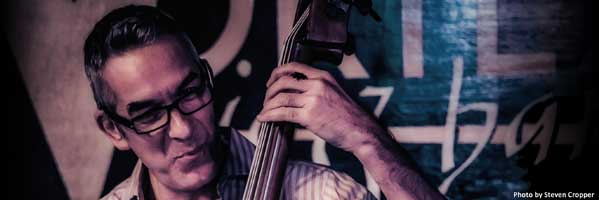Listen to this highly acclaimed album in my Music page. “CHOICES” has received very positive reviews, including 4 stars on Evening Standard’s “CD of the week”; and All About Jazz. It has recently been broadcast on BBC Radio 3 Late Junction.
Listen to some of the tracks!
Alison Bentley (JazzFM) wrote her views on the Sept 24th album launch performance:
Bassist Davide Mantovani‘s new CD is called Choices, and we’re lucky that he didn’t have to choose between the musical styles he plays: jazz, funk, Classical, Senegalese and Brazilian traditional music. Instead, he brought the idioms together in his compositions, and the superb musicians to play them on this launch gig.
There were two early tunes from the 80s, written before Mantovani left Italy. In Plejades, Zoe Rahman’s piano sprinkled notes over the cushioned sound of Guillermo Hill’s mellow Spanish guitar- a gentle, Toninho Horta feel. The guitar duetted with Paul Booth’s soprano sax- imagine Andy Sheppard meeting Egberto Gismonti.
Al-Maranca sang A Cajola D’Oro (Golden Cage) in Neapolitan dialect, sounding very like Milton Nascimento in the falsetto range. Mantovani created a characteristically strong rhythm here by often playing just one repeated bass note, rooting the complex chords.
Escaping from this ‘Golden Cage’ of early years, we heard songs of love, birth and death. Atlantico Temporal (Stormy Atlantic) married the energetic rhythms of a Senegalese wedding dance to edgy altered scale solos, expressing turbulent love- shades of Caetano Veloso. The beautiful guitar/electric bass duet, Esperando Olivia (recorded while waiting for Hill’s daughter to be born) revealed a wonderful rapport between the two. Mantovani sounded like Steve Swallow, playing bass lines and chords behind the guitar melody. Mantovani has toured for eight years with Senegalese kora-player Seckou Keita, and tonight Keita’s brother Suntou Susso played an exquisite solo kora opening to Goodbye Albatross, with swirling notes and ostinato bass lines like waves. Alice Bellasich sang her own lyrics to this haunting, yet uplifting song about a friend’s death, with a little of Astrud Gilberto’s understated tone. The shimmering kora rhythms seemed to influence the piano, and Booth’s breathy flute, in their interwoven ascending improvisations.
Bachorinho was a Bach cello piece, played beautifully by Ivan Hussey, then reworked by the band in the Brazilian Chorinho style. The playful, happy spirit of Hermeto Pascoal’s São Jorge hovered, and the audience cheered the musicians’ sheer virtuosity.
In contrast, Rio Déjà Vu and The Blue Rider had original funky grooves to make you- and the band- smile. In the first, the bass lines didn’t follow conventional funk riffs, but echoed Sunto Susso’s irresistible djembe and dundun drums. And how could the remarkable Asaf Sirkis simultaneously play dramatic African rhythms and pure funk? The second had a heady blend of West African rhythms, heightened by Hill’s wah wah pedal and Mike Stern-like solo, with Booth’s Breckerish sax cutting sweetly through the percussive bateria. There was even some M-BASE-style dissonant battling between sax and piano in Restless Wrestlers.
The stage seemed to expand as all nine musicians gathered for the finale: the anthemic Human…Kind?, coalescing their wonderful musicianship on this intoxicating, warm-hearted gig.
Alison Bentley, Jazz FM


 return to home page
return to home page